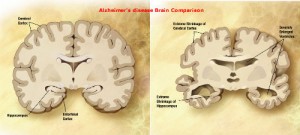
Alzheimer’s disease is a condition that causes changes in behavior and memory lapse. The disease is usually progressive and this means that it becomes worse with time. AD as the condition is commonly referred to most common type of dementia.
What is Dementia?
Dementia is a medical term that is used to refer to a serious memory loss that can interfere with your daily life. As of now, there is no cure for AD. People suffer from AD as a result of two major changes that occurs in the brain.
People with Alzheimer’s disease get
- Plaques – which is characterized by the building up of proteins between the brain nerve cells stopping the cells from signaling to one another.
- Tangles – These are the dying or dead nerve cells. They prevent the nutrients from passing through the cells, resulting in their death.
Symptoms of AD
- Memory loss affecting your day to day activity
- Trouble solving problems or planning
- Being unable to complete some tasks that you were able to handle in the past
- Trouble judging distance or reading
- Making poor judgments
- Withdrawing from hobbies, work and social activities
- Getting confused on where you are or even the time
- Change in personality or mood. This could cause you to easily get upset, anxious or suspicious
It is important to note that these symptoms are different from the normal changes that come with the aging process such as losing things regularly or forgetting names. If you notice any of the above symptoms, you should consult a doctor immediately.
It is estimated that there are over 5 million Americans who are living with AD. The condition affects 1in every 9 people who are aged over 65. Some of the people who are commonly affected by the condition include:
- Those who are aged over 65. The main cause of the condition is old age
- A family history of a person with the condition
- Genes that affect the development of AD
- A serious head injury
- Conditions such as heart diseases, high blood pressure, diabetes, high cholesterol or stroke
- Black or Hispanic people
What causes AD?
Scientists do not know the exact cause of HD, but they are aware that it involves the death of the brain cells and the development of plaques and tangles.
How Vitamin D helps fight AD
Research has proven that there is a close link between vitamin D and the way that the brain works. There are suggestions that a lack of vitamin D could be one of the causes of dementia, such as AD. Many parts of the brain contain vitamin D receptors and this means that vitamin D influences the way we think, act and learn. Scientists have noted that people suffering from AD have less vitamin D receptors in the hippocampus, a part of the brain responsible for forming memories. Vitamin D receptors help to protect the brain from factors that can damage it such as plaques and tangles. Scientists are still researching on whether taking vitamin D can help treat AD.
Sources
- http://www.medicalnewstoday.com/articles/159442.php


Leave a Reply